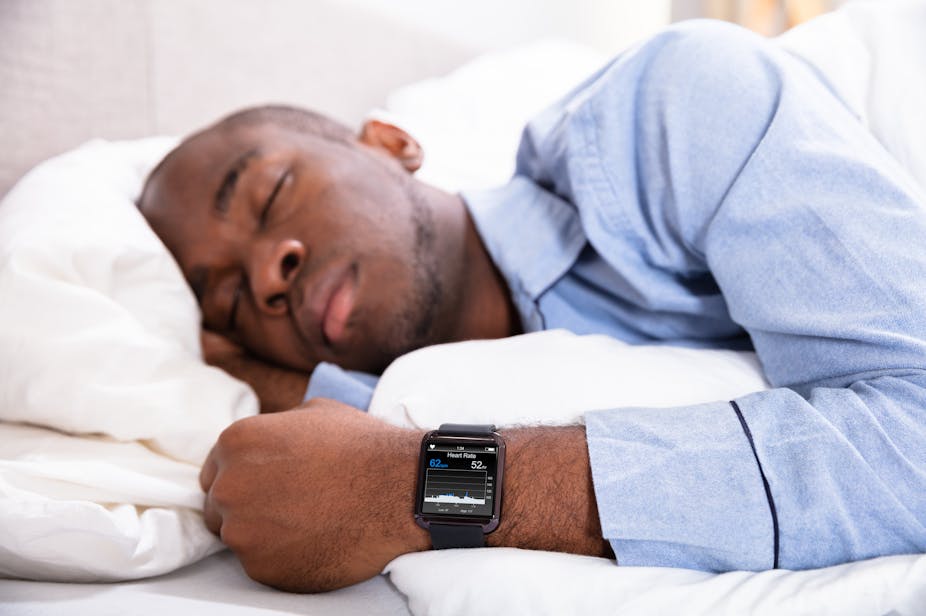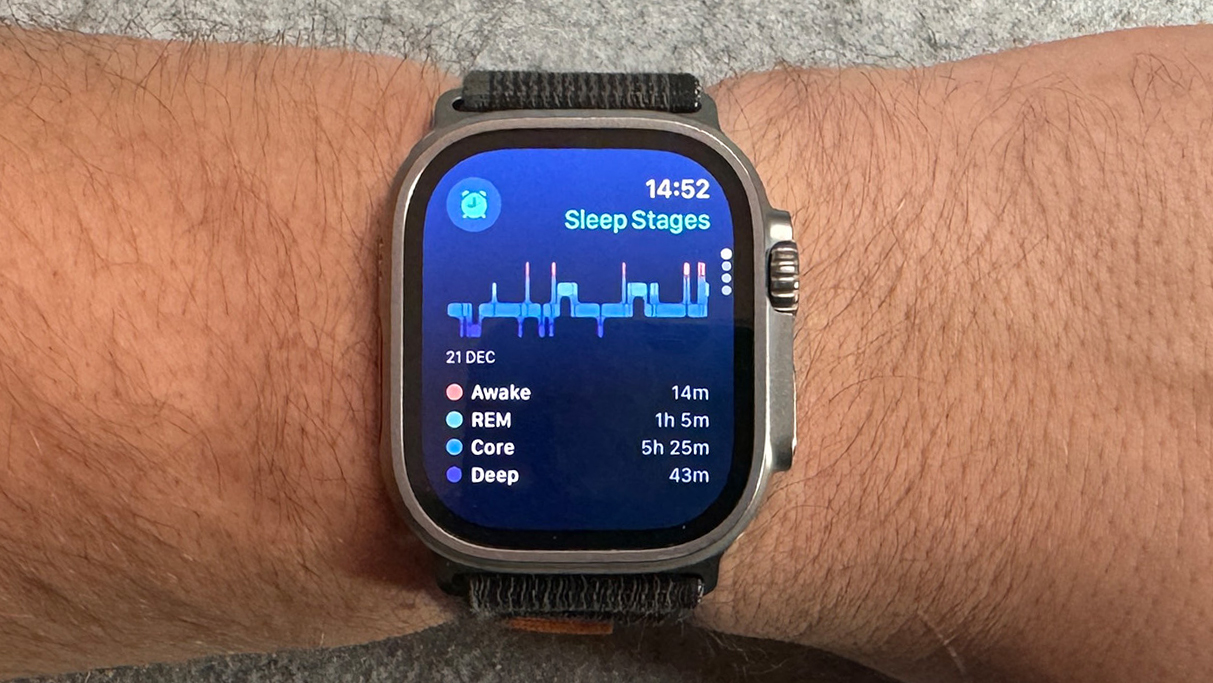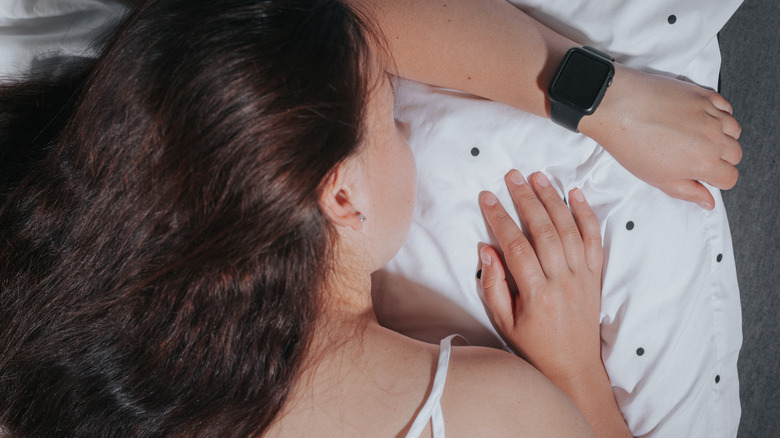Is It Safe to Wear a Smartwatch While Sleeping? Essential Insights
Have you ever wondered if wearing your smartwatch while you sleep is truly safe? You’re not alone.
As smartwatches become a staple in daily life, more and more people are curious about the effects of wearing them all night long. You may love the convenience of tracking your sleep patterns, but what about potential health risks or discomfort?
This article will unravel the mystery and provide you with the insights you need to make informed choices about your nighttime habits. Ready to find out how your smartwatch could affect your sleep and health? Keep reading to ensure you’re making the best decision for your well-being.

Credit: theconversation.com
Smartwatch Radiation Concerns
Smartwatches are becoming a part of daily life. Many people wear them day and night. But some have worries about the radiation they emit. Is it safe to wear them while sleeping? Let’s look at the concerns about smartwatch radiation.
Types Of Radiation Emitted
Smartwatches emit two main types of radiation. They are radiofrequency (RF) and electromagnetic fields (EMF). RF radiation comes from Bluetooth and Wi-Fi connections. EMF radiation comes from the watch’s internal electronics.
These types of radiation are non-ionizing. This means they do not have enough energy to remove tightly bound electrons. They are generally considered less harmful than ionizing radiation.
Potential Health Risks
Some worry that radiation may affect their health. They question whether wearing a smartwatch at night is safe. Non-ionizing radiation is often seen as safe. But long-term exposure effects are not fully understood.
Some studies suggest a link between RF radiation and sleep disturbances. But evidence is not strong enough to prove harm. Experts recommend keeping electronic devices at a distance during sleep.
It is wise to be cautious. Consider using airplane mode at night. This reduces radiation exposure while sleeping. It also saves battery life.
Sleep Quality And Smartwatches
Smartwatches have become popular for tracking sleep quality. They offer insights into how well you sleep. Many people wonder if wearing a smartwatch at night is safe. Understanding how these devices affect sleep is important. This section explores sleep quality and smartwatches. We’ll examine how they impact sleep patterns and monitor sleep stages.
Impact On Sleep Patterns
Smartwatches can affect your sleep patterns. Some users report improved sleep awareness. They notice changes in their routines. This awareness helps in adjusting habits for better rest. But, constant notifications may disturb your sleep. It’s crucial to adjust settings to avoid disruptions. Finding the right balance enhances sleep without interference.
Monitoring Sleep Stages
Smartwatches track sleep stages like light, deep, and REM sleep. This data helps you understand your sleep cycle. Accurate monitoring can reveal if you get enough rest. It identifies patterns that may affect your health. You can use this information to improve sleep quality. Insights from smartwatches guide healthier sleep habits. They empower you to make informed choices about rest.
Comfort And Fit Considerations
Smartwatch comfort during sleep matters. Ensure a snug fit without being too tight. Choose lightweight designs to avoid discomfort.
Wearing a smartwatch while you sleep can be a double-edged sword. On one hand, it can track your sleep patterns, helping you improve your rest. On the other, the comfort and fit of the device can impact the quality of your sleep. Finding the right balance between functionality and comfort is essential. Let’s explore some key considerations to ensure your smartwatch complements your sleep rather than disrupts it.Wrist Discomfort Issues
Wearing a smartwatch to bed can sometimes lead to wrist discomfort. If you’ve ever woken up with a sore wrist, your smartwatch might be too tight or heavy. A good night’s sleep is crucial, and wrist discomfort can be a sneaky saboteur. Consider how your watch feels on your wrist throughout the night. Is it pressing too hard on your skin, or does it leave marks? Some people find that rotating the watch to the inside of the wrist or slightly loosening the strap can make a big difference. How does your wrist feel in the morning when you make these adjustments?Adjusting Strap For Sleep
Adjusting your smartwatch strap for sleep can significantly enhance comfort. A snug fit during the day might not be ideal for nighttime wear. Think about how your wrist might swell slightly at night. Loosening the strap just a bit can provide the flexibility your wrist needs. Try adjusting the strap before bed to find the most comfortable position. Experiment with different tightness levels to see what works best for you. Have you ever considered if the material of your strap could be affecting your comfort? Some materials can cause irritation or sweating, particularly during warmer nights. Opt for softer, more breathable materials if you find your current strap uncomfortable. How does a fabric or silicone strap feel compared to a metal one? By taking these steps, you can ensure your smartwatch becomes a helpful sleep companion rather than a nighttime nuisance. Is your current setup the best it can be? Adjust and assess—your wrist and your sleep might thank you.Battery Life And Charging
Wearing a smartwatch while sleeping has become a common practice. Many people enjoy tracking their sleep patterns. But concerns about battery life and charging arise. Understanding how these factors affect your smartwatch use is crucial.
Battery Life During Sleep
Smartwatches have different battery life spans. Some last longer than others. Tracking your sleep can drain the battery. Choose a watch with good battery life. This ensures it lasts through the night. Check the watch’s specifications before buying. Most watches can last one to two days. Some premium models offer longer battery life. Optimize settings to conserve power. Turn off unnecessary features. This helps your watch last overnight.
Charging Habits And Safety
Develop good charging habits. Charge your smartwatch before bedtime. This ensures it’s ready for the night. Avoid overcharging the device. Overcharging can damage the battery. Use the manufacturer’s charger for safety. Third-party chargers may not be safe. Keep the charging area clean and dry. Avoid charging on soft surfaces. This prevents overheating and damage. Check for software updates regularly. Updates can improve battery performance. Maintain your smartwatch for the best results.
Privacy And Data Security
Smartwatches have become a staple in our daily lives, tracking everything from steps to heart rate. But as you tuck into bed with your smartwatch, have you ever wondered about the privacy and data security aspects? It’s crucial to know how much data is being collected while you sleep and what happens to it. Are you comfortable with your sleep patterns being recorded and stored? Understanding the implications of these data practices can help you make informed decisions about bedtime gadget habits.
Data Collection During Sleep
Smartwatches don’t take a break when you do. They continue to gather information, monitoring your sleep stages, heart rate, and even your nighttime movements. This data can be incredibly detailed, offering insights into your sleep quality and overall health. But what happens to all this data after it’s collected?
Consider your own experience: ever woken up to a sleep report that knows more about your night than you do? That’s the power—and potential risk—of data collection. While beneficial for health tracking, it raises questions about who else might see this information.
Protecting Personal Information
It’s essential to ensure that your personal data is safe. Many smartwatch companies promise encryption and secure storage, but it’s wise to verify these claims. Check the privacy settings in your smartwatch app. You can often control what data is shared and with whom.
Think about this: would you want your sleep data shared with third parties? Some apps allow you to opt-out of data sharing. Taking time to review these settings can protect your privacy. You wouldn’t leave your front door unlocked, so why leave your data unprotected?
As you use your smartwatch, ask yourself: Are you comfortable with the level of data privacy provided? Your sleep data is personal; make sure it stays that way. Ensuring your data security isn’t just about technology—it’s about peace of mind.
Medical And Health Benefits
Wearing a smartwatch while sleeping offers various medical and health benefits. Smartwatches can track vital metrics and provide alerts that support health monitoring. These features can help you maintain a healthier lifestyle.
Tracking Health Metrics
Smartwatches can track different health metrics while you sleep. They monitor heart rate and sleep patterns. This data can inform you about your sleep quality. You can understand how well you rest during the night. Tracking also includes oxygen levels and stress indicators. These metrics help you recognize changes in your health. Knowing these patterns can guide you to make better health decisions.
Alerts And Health Monitoring
Smartwatches offer alerts for health monitoring. They can inform you of abnormal heart rates. You get notified if your breathing changes during sleep. These alerts can be crucial for people with health issues. For example, those with heart conditions or sleep apnea. The smartwatch acts like a health assistant. It gives timely notifications that can prompt you to seek medical advice. This proactive monitoring supports better overall health.
User Experiences And Testimonials
Many users feel comfortable wearing smartwatches during sleep, sharing positive experiences and improved health insights. Testimonials often highlight benefits like sleep tracking and gentle alarms, without any noticeable discomfort. Safety concerns are minimal, as most report no skin irritation or sleep disruption.
Smartwatches are part of our daily lives, but what happens when you wear one while sleeping? Many users have shared their experiences and testimonials, offering valuable insights. Some rave about the benefits, while others express concerns. Let’s dive into what people are saying.Positive Feedback
Many users find wearing a smartwatch while sleeping beneficial. It tracks sleep patterns effortlessly, giving you insights into how well you rest. Imagine waking up and knowing how much deep sleep you got last night. One user shared that wearing their smartwatch helps them understand their sleep cycle better. The data encourages them to improve their bedtime routine, ultimately feeling more refreshed in the morning. Another person mentioned how the gentle vibrations of the alarm on their smartwatch wake them up without startling them. This subtle feature helps start the day on a calm note.Negative Experiences
Not everyone finds sleeping with a smartwatch comfortable. Some users complain about the feeling of a device strapped to their wrist, which can be distracting or uncomfortable during the night. A few users have reported skin irritation from wearing the smartwatch overnight. Would you risk your comfort for the sake of tracking sleep? Battery life is another concern. Some users worry about their smartwatch running out of power before morning. This concern might make you reconsider if you rely heavily on your smartwatch during the day. The decision to wear a smartwatch while sleeping varies from person to person. Have you considered the impact on your sleep quality and comfort?
Credit: www.techradar.com

Credit: www.slashgear.com
Frequently Asked Questions
Can Smartwatches Affect Sleep Quality?
Wearing a smartwatch can impact sleep quality if notifications disturb you. However, many smartwatches offer sleep tracking features that provide insights into sleep patterns. By enabling sleep mode or silent mode, you can minimize disturbances and optimize your rest while benefiting from the device’s sleep-tracking capabilities.
Is Radiation From Smartwatches Harmful?
Smartwatches emit low-level radiation similar to smartphones. Current research suggests it’s not harmful to wear while sleeping. However, if concerned, consider removing it before bed. Most users experience no adverse effects, and the benefits often outweigh potential risks, especially for tracking sleep health.
Do Smartwatches Improve Sleep Tracking Accuracy?
Smartwatches can improve sleep tracking accuracy by monitoring movements and heart rate. This data helps identify sleep stages, offering valuable insights into your sleep quality. While not as precise as medical-grade devices, smartwatches provide useful information for improving sleep habits and overall health.
Should I Wear A Smartwatch Every Night?
Wearing a smartwatch nightly depends on personal preference. Many users find sleep tracking beneficial for understanding sleep patterns. However, if discomfort or battery concerns arise, consider alternating nights. The key is finding a balance that maximizes benefits while ensuring comfort and practicality.
Conclusion
Wearing a smartwatch while sleeping can be safe. Benefits include sleep tracking and health monitoring. Some may find it uncomfortable or distracting. Choose a lightweight model for better comfort. Ensure it fits snugly but not too tight. Check battery levels before bed to avoid disruptions.
Consider any potential skin irritation from prolonged use. Listen to your body and adjust as needed. Personal comfort and needs should guide your decision. Smartwatches offer useful insights for many. Always prioritize what feels right for your sleep quality and peace of mind.
